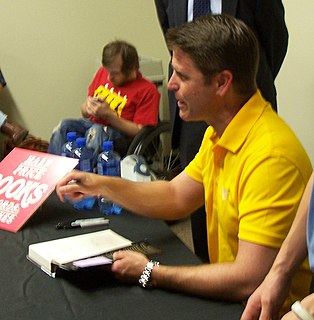A Quote by Michael Bloomberg
Now, you might say – “But why should we pay people for doing what they’re supposed to do?” It’s a fair question – but think of it this way: Every other anti-poverty program that’s been tried has failed to get the national poverty rate below 11 percent... Why shouldn’t we experiment with a program built around the one strategy that has proven time and again to work wonders – capitalism?
Related Quotes
The black unemployment rate has to be twice that of the white rate in the US. If the national unemployment rate were 6.8 percent, everyone would be freaking out. We ought to not take too much solace in the 6.8 percent, but ask ourselves what can we do to bring that down to white rates, which are below 4 percent now. Some of that has to do with education, but that's just part of the story. You find that those unemployment differentials persist across every education level. I think it means pushing back on discrimination and helping people who can't find work get into the job market.
In Germany, many other countries, college tuition is free. Why isn`t free in America? Why do we have the highest rate of childhood poverty when other countries have rates much lower than we have? Why don`t we have pay equity for women workers? Why aren`t we leading the world in transforming our energy system in terms of climate change? We can do that. Are we dumb? Are we lazy? Not the case.
The reason socialism has failed around the world every time it's been tried is because people in socialist countries have looked at the United States and have said if they can have it that good, we can. It's a failed, flawed ideology, but if you ask socialists why it's always failed, it's because the United States has stood in the way.
Most of Marx's predictions have failed to materialize, and his labor theory of value and other ideas have been proven wrong. Marx failed to recognize the incentive system built into the capitalist model - consumer choice and the profit motive of the entrepreneur. The irony is that capitalism, not socialism or Marxism, that has liberated the worker from the chains of poverty, monopoly, war, and oppression, and has better achieved Marx's vision of a millennium of hope, peace, abundance, leisure, and aesthetic expression for the 'full' human being.
It's immoral to parent irresponsibly... And it doesn't help matters any when prime time tv, like "Murphy Brown", a character who is supposed to represent a successful career woman of today, mocks the importance of the father by bearing a child alone, and calling it just another "lifestyle choice." Marriage is probably the best anti-poverty program there is... Even though our cultural leaders in Hollywood, network TV, the national newspapers routinely jeer at [such values] I think most of us in this room know that some things are good, and other things are wrong.
We draw many benefits from globalization that people take for granted. Poverty has been reduced massively around the world. If you look at the Chinese numbers, it is quite mind-boggling: 700 million people taken out of poverty in a matter of 40 years, the poverty rate having moved from over 30 per cent from hardly six per cent now. That would not have happened if there had not been globalization.
Too often we are scared. Scared of what we might not be able to do. Scared of what people might think if we tried. We let fears stand in the way of our hopes. We say no when we want to say yes. We sit quietly when we want to scream. And we shout with the others, When we should keep our mouths shut. Why? After all, we do only go around once. There's really no time to be afraid. JUST DO IT.
































